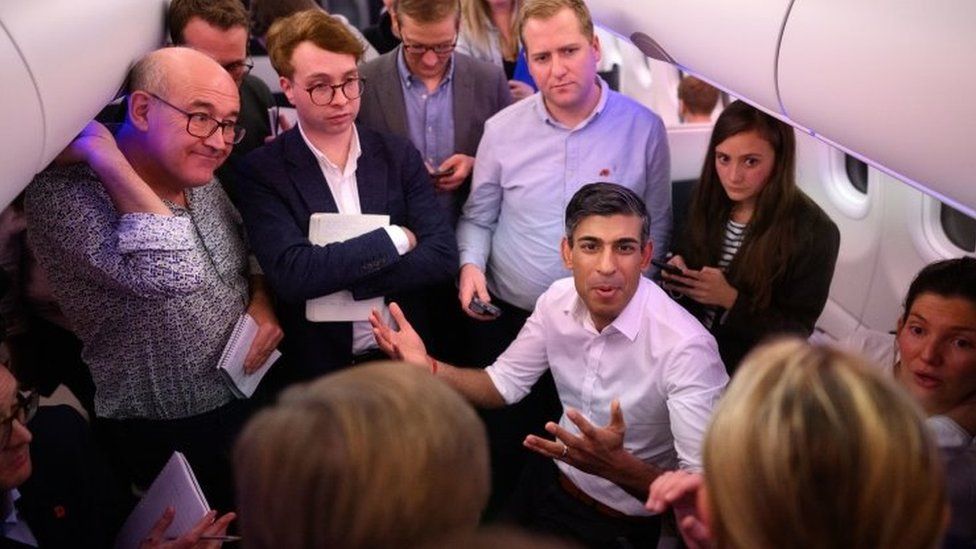ARTICLE AD BOX
 Image source, PA Media
Image source, PA Media
Prime Minister Rishi Sunak will hold talks with world leaders at the G20 summit in Indonesia this week
By Joshua Nevett & Nick Eardley
BBC Politics
The UK economy has "clearly" stabilised, Rishi Sunak has said, as he vowed to deliver on market expectations of shoring up the public finances.
The prime minister said this week's autumn statement would "put our public finances on a sustainable trajectory".
Chancellor Jeremy Hunt is set to unveil spending cuts and tax rises to fill a gap in the UK's finances.
Mr Sunak said he was fixing errors made by his predecessor Liz Truss, whose mini-budget left markets reeling.
The mini-budget in September included about £45bn of unfunded tax cuts and was followed by days of market turbulence, a fall in the value of the pound and rises in the cost of UK government borrowing.
Ms Truss, who later accepted her mini-budget "went further and faster than markets were expecting", resigned last month after Conservative MPs rebelled against her leadership.
She was replaced by Mr Sunak who, in his first speech as prime minister, said Ms Truss had made "mistakes" and he had been elected by his party "to fix them".
Speaking to reporters on a plane to the G20 summit in Indonesia - his second foreign trip as PM - Mr Sunak said "financial conditions in the UK have stabilised, clearly".
He said to maintain that stability, "delivering on the expectations of international markets" and making sure "our fiscal position is on a more sustainable trajectory" were crucial.
"And that's what we will do," in the autumn statement, he said.
On Sunday, his chancellor Mr Hunt told the BBC everyone would need to pay "a bit more tax" to put the economy on a firmer footing.
Soaring living costs and a warning from the Bank of England that the UK is facing its longest recession since records began are the backdrop for the chancellor's forthcoming announcement.
While acknowledging his plan would "disappoint people", Mr Hunt promised to protect the "most vulnerable" and "make the recession we are in as short and shallow as possible".
Jeremy Hunt says he wants to make sure any recession is short and shallow
Some Conservative MPs have expressed concern that the chancellor's plans go too far - particularly when it comes to tax rises.
The chancellor could face a rebellion if the government decided not to increase pensions and benefits in line with inflation, both of which are costly.
On Sunday, former cabinet minister Simon Clarke said tax rises risked choking off economic growth and suggested balancing the books through spending cuts instead.
Former Chancellor Kwasi Kwarteng echoed that argument last week, saying said growth would not stem from "putting up our taxes".
Another former cabinet minister told the BBC that "overcooking" the plans could make a recession deeper and longer.
They said they were sceptical about the size of the "black hole" in the public finances and said a number of Tory MPs had concerns.
Treasury sources have previously estimated there was a gap of around £55bn in the public finances, but some economists have questioned this.
Asked whether the autumn budget would spell years of pain for the public, Mr Sunak said the plan was to "lay the foundations" for growth so taxes can be cut "over time".
"The chancellor has also said that part of our job is not just to bring stability back to the system, which we will do, but it's also to lay the foundations for the economy to recover and grow," he said.
"That's how we're going to be able to cut people's taxes over time and support public services. And you'll hear that side of the equation from the Chancellor as well."
The prime minister will hold talks with G20 world leaders until Wednesday before flying back to the UK for the autumn statement on Thursday.
At the summit, he is expected to call out Russia President Vladimir Putin for invading Ukraine and urge fellow leaders to "fix the weaknesses in the international economic system".

 2 years ago
26
2 years ago
26








 English (US) ·
English (US) ·